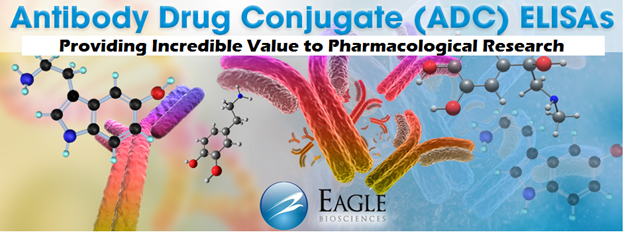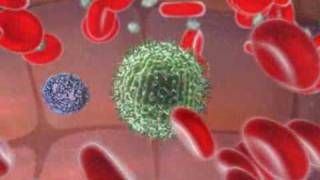
Eagle Biosciences’ Immunology Assay Kit line is a complete group of products comprised of a unique,versatile set of products for a variety of applications, research, and fields of study surrounding overall immunological health and immunological-related disorders. Our Antibody Drug Conjugate (ADC) ELISA menu are a comprehensive set of assays which are the first commercially available quantitative ADC test in ELISA format. Each of these assays: MMAE Antibody Drug Conjugate (ADC) ELISA Assay Kit, MMAF Antibody Drug Conjugate (A DC) ELISA Assay Kit, and DM1 Antibody Drug Conjugate (ADC) ELISA Assay Kit have a variety of benefits such as excellent sensitivity and specificity. Together, these assay kits provide incredible value to pre-clinical and clinical pharmacology studies, cancer research, and more specifically antitumor therapeutic investigation.
Why Measure Antibody Drug Conjugates (ADCs) using our Assays?
Antibody-drug conjugates (ADCs) are a new type of targeted therapy for cancer treatment that bring a lot of hope to oncology-related areas. ADCs are cancer cell specific monoclonal antibodies that are conjugated with highly potent cyotoxics via a specific linker, which deliver and release the drug directly inside the tumor cell. ADCs, thus significantly increase target specificity and reduce toxicity.
Measurement of circulating specific cytotoxic ADCs are extremely important for pre-clinical and clinical studies to help discover unique, targeted, efficacious, and safer anticancer treatments.Given the variations in antibodies, drug potencies, and tumor types, there’s plenty of room for multiple novel linker technologies and techniques that offer better control for making ADCs.
The assays in Eagle Biosciences’ ADC kit menu have been developed with specific antibodies to DM1, MMAE, and MMAF and offer not only the ability to measure numerous sample types but also multiple species.
Key Advantages of EagleBio’s Antibody Drug Conjugate Assays
- Excellent sensitivity
- Simple procedure
- Wide dynamic range
- Quick results: under 3 hours
- Versatile: multiple sample types & species
Related Kits:
MMAE Antibody Drug Conjugate (ADC) ELISA Assay Kit
MMAF Antibody Drug Conjugate (A DC) ELISA Assay Kit
DM1 Antibody Drug Conjugate (ADC) ELISA Assay Kit
Immunology Assay Kits
Related News:
October 2014: Eagle Biosciences Introduces New Antibody Drug Conjugate ELISA Assays














